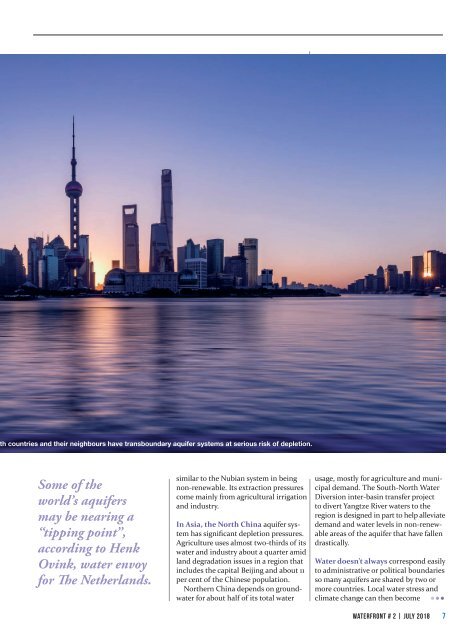Stockholm WaterFront no 2, 2018
In the new issue of WaterFront, we look at the connections between humans and nature. It is an exciting moment in time, when the traditional view on the relationship between ecosystems and human development is increasingly being challenged. In the past, nature has at times been seen as a foe to be conquered, but we’re now starting to realize that nature in fact holds the key to solving many of humanity’s most pressing challenges. Yet, the shift is not happening fast enough. Investment in nature-based solutions and ecosystems research is clearly insufficient. To hopefully help speed things up, this year’s World Water Week will explore some of these issues through its theme Water, ecosystems and human development. In this issue of WaterFront we examine the alarming threat to the world’s major aquifers on page 4. Still, there is also a lot of good news, with signs of a global rethink – on page 12 you can read about how the World Bank wants to bring ecological expertise into their projects at an earlier stage and a story on page 14 explores new tools that help infrastructure planners calculate climate risks. To learn more about how economists are trying to bring ecosystems into the equation, turn to page 18. Last, but not least, don’t miss Torkil Jønch Clausens’ analysis of what really happened at the High-level Political Forum on page 22. Enjoy the read!
In the new issue of WaterFront, we look at the connections between humans and nature. It is an exciting moment in time, when the traditional view on the relationship between ecosystems and human development is increasingly being challenged. In the past, nature has at times been seen as a foe to be conquered, but we’re now starting to realize that nature in fact holds the key to solving many of humanity’s most pressing challenges.
Yet, the shift is not happening fast enough. Investment in nature-based solutions and ecosystems research is clearly insufficient. To hopefully help speed things up, this year’s World Water Week will explore some of these issues through its theme Water, ecosystems and human development.
In this issue of WaterFront we examine the alarming threat to the world’s major aquifers on page 4.
Still, there is also a lot of good news, with signs of a global rethink – on page 12 you can read about how the World Bank wants to bring ecological expertise into their projects at an earlier stage and a story on page 14 explores new tools that help infrastructure planners calculate climate risks. To learn more about how economists are trying to bring ecosystems into the equation, turn to page 18.
Last, but not least, don’t miss Torkil Jønch Clausens’ analysis of what really happened at the High-level Political Forum on page 22.
Enjoy the read!
You also want an ePaper? Increase the reach of your titles
YUMPU automatically turns print PDFs into web optimized ePapers that Google loves.
h countries and their neighbours have transboundary aquifer systems at serious risk of depletion.<br />
Some of the<br />
world’s aquifers<br />
may be nearing a<br />
“tipping point’’,<br />
according to Henk<br />
Ovink, water envoy<br />
for The Netherlands.<br />
similar to the Nubian system in being<br />
<strong>no</strong>n-renewable. Its extraction pressures<br />
come mainly from agricultural irrigation<br />
and industry.<br />
In Asia, the North China aquifer system<br />
has significant depletion pressures.<br />
Agriculture uses almost two-thirds of its<br />
water and industry about a quarter amid<br />
land degradation issues in a region that<br />
includes the capital Beijing and about 11<br />
per cent of the Chinese population.<br />
Northern China depends on groundwater<br />
for about half of its total water<br />
usage, mostly for agriculture and municipal<br />
demand. The South-North Water<br />
Diversion inter-basin transfer project<br />
to divert Yangtze River waters to the<br />
region is designed in part to help alleviate<br />
demand and water levels in <strong>no</strong>n-renewable<br />
areas of the aquifer that have fallen<br />
drastically.<br />
Water doesn’t always correspond easily<br />
to administrative or political boundaries<br />
so many aquifers are shared by two or<br />
more countries. Local water stress and<br />
climate change can then become<br />
WATERFRONT # 2 | july <strong>2018</strong><br />
7


















